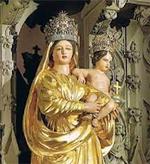Eastertide: All of April
Our reflection on the Resurrection for Eastertide this year comes from St. Methodius of Olympus, who was a bishop and ecclesiastical author, born in the third century and died a martyr, probably around 310. St. Methodius was especially well educated in philosophy and was an important theologian. He opposed the teaching of Origen on several points. In particular, he opposed Origen's doctrine that man's body at the resurrection is not the same body as he had in life. He also opposed his idea of the world's eternity and the erroneous notions it involved. Nevertheless, like Origen, Methodius was strongly influenced by Plato's philosophy, and uses to a great extent the allegorical explanation of Scripture. The passage we cite comes from The Discourse on the Resurrection, 13.
Since flesh was made to border on incorruption and corruption, being itself neither the one nor the other, and was overcome by corruption for the sake of pleasure, though it was the work and property of incorruption; therefore it became corruptible, and was laid in the dust of the earth. When, then, it was overcome by corruption, and delivered over to death through disobedience, God did not leave it to corruption, to be triumphed over as an inheritance; but, after conquering death by the resurrection, delivered it again to incorruption, in order that corruption might not receive the property of incorruption, but incorruption that of corruption.
Therefore the apostle answers thus, "For this corruptible must put on incorruption, and this mortal must put on immortality."
Now the corruptible and mortal putting on immortality, what else is it but that which is "sown in corruption and raised in incorruption," — for the soul is not corruptible or mortal; but this which is mortal and corrupting is of flesh — in order that, "as we have borne the image of the earthly, we shall also bear the image of the heavenly."
For the image of the earthly which we have borne is this, "You are dust, and unto dust you shall return."
But the image of the heavenly is the resurrection from the dead, and incorruption, in order that "as Christ was raised up from the dead by the glory of the Father, so we also should walk in newness of life."
But if any one were to think that the earthly image is the flesh itself, but the heavenly image some other spiritual body besides the flesh, let him first consider that Christ, the heavenly man, when He appeared, bore the same form of limbs and the same image of flesh as ours, through which also He, who was not man, became man, that "as in Adam all die, even so in Christ shall all be made alive."
For if He bore flesh for any other reason that that of setting the flesh free, and raising it up, why did He bear flesh superfluously, as He purposed neither to save it, nor to raise it up? But the Son of God does nothing superfluously.
He did not then take the form of a servant uselessly, but to raise it up and save it.
For He truly was made man, and died, and not in mere appearance, but that He might truly be shown to be the first begotten from the dead, changing the earthly into the heavenly, and the mortal into the immortal.
When, then, St. Paul says that "flesh and blood cannot inherit the kingdom of God," he does not give a disparaging opinion of the regeneration of the flesh, but would teach that the kingdom of God, which is eternal life, is not possessed by the body, but the body by the life.
For if the kingdom of God, which is life, were possessed by the body, it would happen that the life would be consumed by corruption.
But now the life possesses what is dying, in order that "death may be swallowed up in victory" by life, and the corruptible may be seen to be the possession of incorruption and immortality, while it becomes unbound and free from death and sin, but the slave and servant of immortality; so that the body may be the possession of incorruption, and not incorruption that of the body.
This item 6708 digitally provided courtesy of CatholicCulture.org






